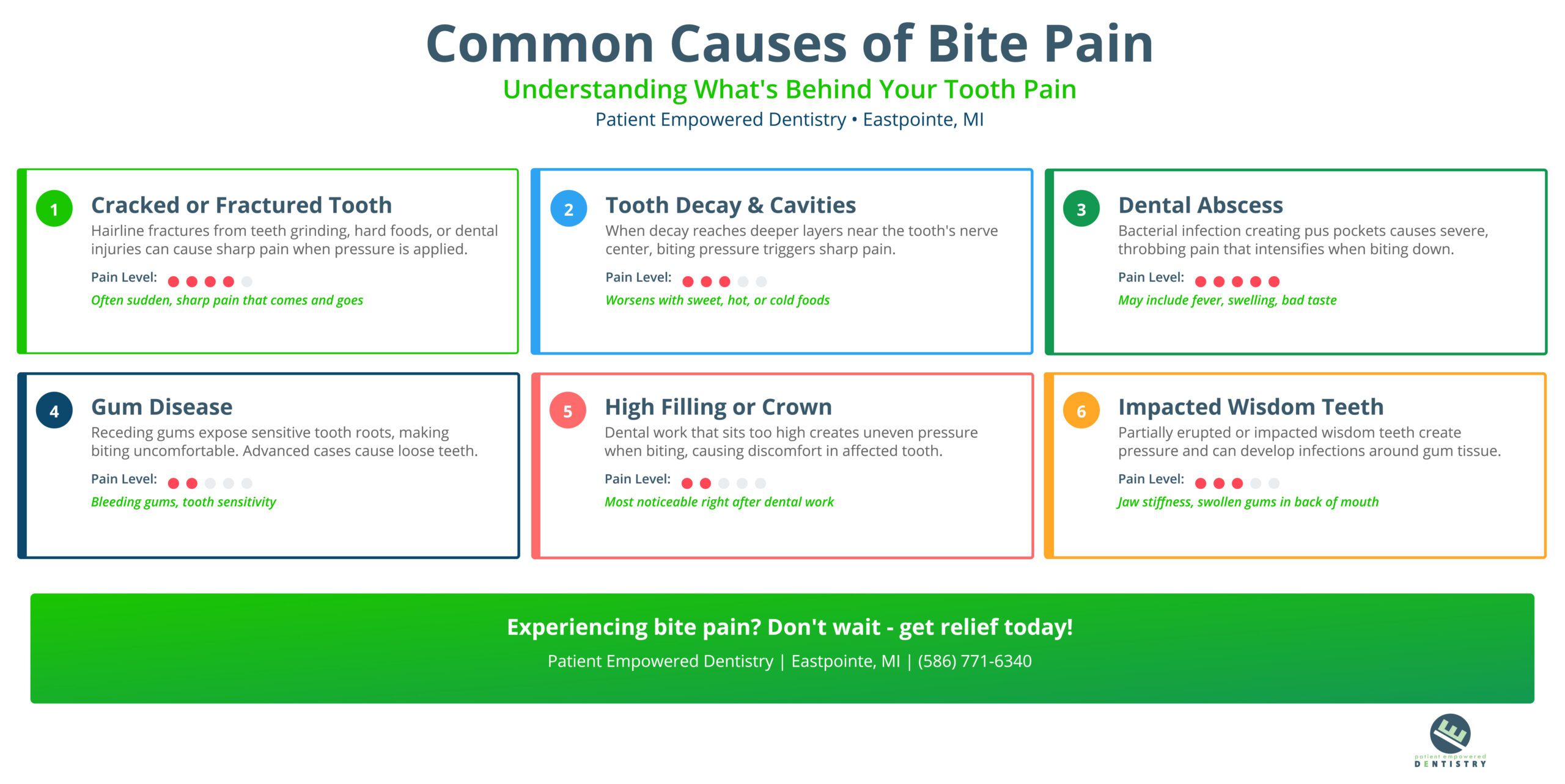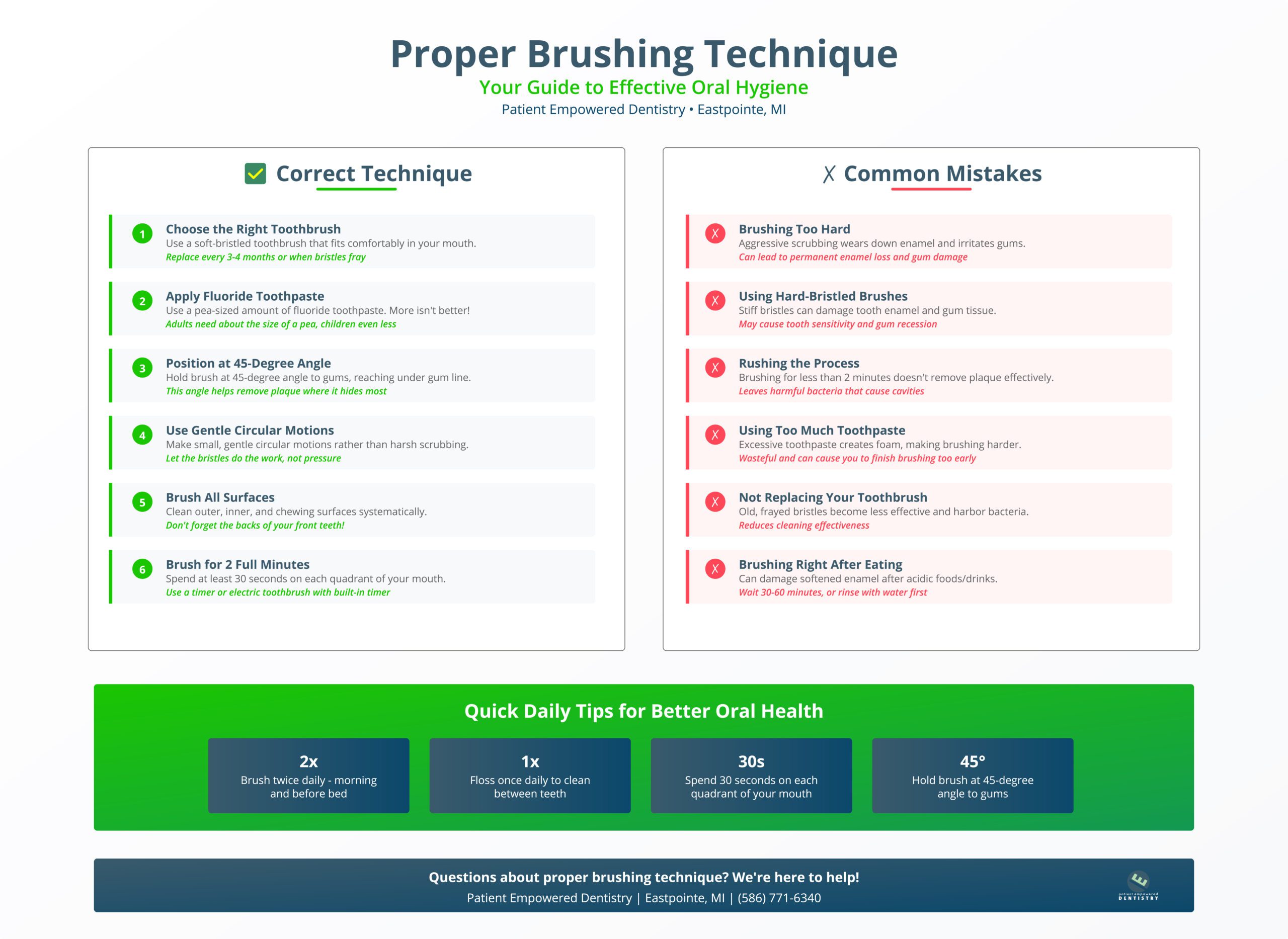Have you ever been enjoying your favorite sandwich when suddenly – ouch! – that sharp, shooting pain when you bite down stops you in your tracks? You’re definitely not alone. That uncomfortable sensation when pressure hits a specific tooth is your body’s way of saying, “Hey, something needs attention here!”
At Patient Empowered Dentistry in Eastpointe, MI, we understand how frustrating and disruptive tooth pain can be, especially when it interferes with something as basic as eating. When you experience pain while biting down, it’s important to listen to what your mouth is telling you about your oral health.
Let’s explore the common reasons behind bite-related tooth pain and what you can do to find relief.
What Causes Pain When You Bite Down?
When you bite down and feel pain, it means extra pressure is being applied to a tooth or surrounding tissues that are already compromised. Think of it like pressing on a bruise – normal pressure that wouldn’t usually bother you suddenly becomes uncomfortable when there’s an underlying issue.
This discomfort is your body’s alert system, signaling that something’s wrong and needs professional attention. Let’s look at the most common culprits behind this type of dental pain.

Common Causes of Tooth Pain When Biting
Cracked or Fractured Teeth
Small cracks aren’t always visible to the naked eye, but they can cause significant pain when you bite down. These hairline fractures might develop from several causes, including teeth grinding (especially at night), biting hard objects like ice or pen caps, dental injuries from sports or accidents, or large cavities that weaken the tooth structure.
The tricky part about cracked teeth? These tiny fractures can be nearly impossible to spot without special diagnostic techniques. Your back teeth are particularly susceptible since they absorb most of your biting force.
Tooth Decay and Cavities
Cavities don’t always announce themselves with obvious symptoms until they reach deeper layers of your tooth. When decay creates a small hole near the nerves inside your tooth’s pulp, biting down triggers sharp pain as extra pressure hits the affected area.
In severe cases, untreated decay can lead to infected dental pulp, potentially requiring root canal therapy to save the tooth. When decay affects tooth roots or exposed dentin (from gum recession), even mild pressure from biting can cause significant discomfort.
Dental Abscess – A Serious Infection
An abscessed tooth is essentially an untreated bacterial infection that creates a pus pocket. When an abscess forms at the root surface or in surrounding tissues, it causes excruciating pain when biting down. This serious condition often brings persistent, throbbing tooth pain, sensitivity to hot and cold temperatures, facial swelling or tender lymph nodes, fever, and bleeding gums around the affected area.
If you suspect an abscessed tooth, this requires immediate dental care – the infection can spread to your jaw or other parts of your body without prompt treatment.
Gum Disease and Periodontal Issues
Both early-stage gum disease (gingivitis) and advanced periodontal disease can cause pain when you bite. Aggressive brushing can accelerate gum recession, exposing sensitive tooth roots and making biting uncomfortable.
These conditions often lead to gum recession exposing root surfaces, bone loss around teeth, loose teeth that shift under pressure, and increased tooth sensitivity. The good news? Early stages can often be reversed with improved dental care habits, though advanced cases need professional intervention.
Sinus Infection Connection
Here’s something that might surprise you: pain in your upper teeth, particularly upper molars, might actually stem from a sinus infection. Since your upper tooth roots sit close to sinus cavities, sinus inflammation can cause tooth pain that worsens when biting down.
This connection often confuses patients because the tooth might be perfectly healthy, yet you’ll still feel pain when you bite due to pressure on inflamed tissues around the tooth roots.
Dental Work Complications
Sometimes the problem stems from recent or aging dental work. A filling that sits too high can cause pain when you bite, a loose filling or crown can create discomfort, or recent dental treatment might be irritating the tooth’s pulp.
The good news? These complications are usually straightforward to fix – often a simple adjustment provides immediate relief.
Wisdom Teeth Problems
Impacted wisdom teeth or partially erupted ones can cause significant pain when biting, especially if they’re pressing against other teeth or have developed an infection around the gum tissue.
When Should You Seek Emergency Care?
⚠️ Seek Emergency Dental Care If You Experience:
While some tooth pain might be temporarily manageable at home, certain symptoms indicate you need prompt attention. Seek emergency dental care if you experience:
- Severe pain interfering with sleep or daily activities
- Noticeable swelling in the face or gums
- Pain accompanied by fever
- Loose teeth or obvious dental injuries
- Persistent pain with bleeding gums
- Pain that over-the-counter medications won’t touch
Don’t wait until a minor issue becomes a major problem! Your tooth’s pulp and surrounding structures can sustain permanent damage without prompt treatment.

Treatment Options for Bite-Related Pain
Treatment depends entirely on the underlying cause. Let’s explore the options based on what’s causing your discomfort.
For Cracked Teeth
Treatment depends on how deep the crack goes. Your dentist will choose the most conservative option that effectively protects your tooth:
- Dental bonding for minor cracks
- A dental crown to protect a damaged tooth
- Root canal therapy if a crack reaches the pulp
- Extraction in severe cases where the tooth can’t be saved
Most cracked teeth can be successfully saved with proper treatment – the key is catching problems early!
For Cavities and Decay
Cavity treatment varies based on how much of the tooth is affected. Earlier detection means simpler, less invasive treatment:
- Fillings to remove decay and restore the tooth
- Treatment for loose fillings causing pain
- Inlays or onlays for larger decay areas
- Root canal and crown for advanced decay reaching the tooth’s pulp
Even advanced decay can often be successfully treated, allowing you to keep your natural tooth.
For Dental Abscesses
A dental abscess requires prompt professional treatment. The goal is to eliminate infection while saving your natural tooth when possible:
- Drainage of the abscess
- Root canal treatment for infected dental pulp
- Antibiotics to clear the infection
- Extraction in severe cases where root canal therapy isn’t possible
With prompt treatment, most abscessed teeth can be successfully saved.
For Gum Disease
Treatment ranges from simple cleanings to intensive procedures, depending on severity:
- Professional dental cleaning
- Scaling and root planing to remove bacteria
- Antibiotics for bacterial infections
- Surgical interventions for advanced periodontal disease
Early-stage gum disease can often be completely reversed with non-surgical treatments.
For Sinus-Related Pain
When tooth pain stems from a sinus infection, treating the sinus problem resolves dental discomfort:
- Treating the underlying sinus infection (often with a primary care provider)
- Pain management while the infection clears
- Dental examination to rule out actual dental issues
Once the sinus infection clears, the tooth pain should disappear completely.

Preventing Bite Pain Before It Starts
Your Prevention Toolkit
The best treatment is prevention! Proper dental care helps you avoid many issues that cause pain when biting. We recommend:
- Maintaining excellent oral hygiene by brushing twice daily and flossing once daily
- Using a soft-bristled toothbrush with gentle technique
- Wearing a night guard if you grind your teeth
- Avoiding chewing ice or hard objects
- Scheduling regular dental checkups to catch problems early
- Addressing minor problems before they become major issues
- Staying hydrated to prevent dry mouth which contributes to tooth decay
These simple daily habits are much easier (and less expensive) than dealing with complex dental problems later. A little prevention now can save you from significant pain and complicated treatments down the road.
Don’t Ignore the Warning Signs
While over-the-counter pain relievers might provide temporary relief, they don’t address the underlying cause of your bite pain. If you feel pain when you bite on a specific tooth, your body is signaling that something needs professional attention.
At Patient Empowered Dentistry, we’re committed to not just treating your pain but empowering you with knowledge about your dental health. Whether you’re dealing with sensitive teeth from exposed dentin, tooth decay causing nerve irritation, or any other issue affecting how your teeth meet when you bite, we’ll create a treatment plan tailored to your specific needs.
Don’t let tooth pain keep you from enjoying life. Contact our Eastpointe office today to schedule an appointment and take the first step toward relief from that nagging pain when you bite down!
Your comfort matters to us, and we’re here to help you achieve optimal oral health with compassionate, personalized dental care that addresses the root cause, not just the symptoms. Remember, early intervention often means simpler, more comfortable treatment options – so don’t wait to get the care you need.
